|
CD of the Month:
* SUSANNE ABBUEHL * COMPASS * ECM
Other CDs Reviewed this Month:
* ELISE LEBEC: POSSIBLE DREAMS
* SCHUBERT: TROUT QUINTET * LEOPOLD STRING TRIO *
* GARY MALKIN: WINTERFAITH
* HANDEL: DELIRIO * NATALIE DESSAY *EMMANUELLE HAIM
* CHARLES LLOYD, ZAKIR HUSSAIN & ERIC HARLAND * SANGAM
* JONATHAN CROW, DOUGLAS MCNABNEY & MATT HAIMOVITZ *
* MOZART THE MASON
* HONORING (REAL MYSTIC)
* RALPH TOWNER * TIME LINE
* JOHN LEE HOOKER, JR * COLD AS ICE
 |
ELISE LEBEC: POSSIBLE DREAMS *
LECD 41324
|
|
0 |
5 |
|
Performance |
 |
|
Sonics |
 |
|
I'm hooked. Elise Lebec may categorize her impressions
for solo piano as "New Age," but I'm content to call them beautiful.
Inspired by nature, love, and hope for the future, Lebec's 14 original
compositions mix familiar harmonies with occasionally surprising tempo and
dynamic changes. Wonderfully recorded, with the natural deep resonance and
ringing top that befit a former Steinway Piano-sponsored artist, Lebec's
music benefits from an unpretentious harmonic sophistication that
distinguishes it from the heap.
Born in San Diego, the daughter of "a hippie who sat on
the lawn and played the guitar a lot," Elise Lebec was raised on George
Winston, Enya, Loreena McKinnit and Andreas Vollenweider. Beethoven, the
Beetles, and other influences followed. In New Zealand she performed at
charity concerts. In Australia, she collaborated with painter Charles
Billich, the official artist for the 1996 Olympics, producing an album under
the name Tabitha Lebec. Later she co-founded the band Post Pop Federation,
opened for Sheryl Crow, and worked in Europe and Nashville as pianist,
vocalist, and composer with a host of music luminaries. Songs she's written
with Pat Robinson are slated to appear in six forthcoming films, with one of
her own songs and vocals slated for "Americanizing Shelly." The woman has a
lot going for her, all of which can be heard in her lovely, gratifying
compositions that stimulate the mind while soothing the spirit. |
|

|
|
Schubert's
Glorious Trout
Few other works in the chamber literature have achieved
the popularity of Franz Schubert's 'Trout' Quintet. Otherwise known as the
Piano Quintet in A major, D667, it was most likely composed in the summer of
1819, when the composer was 22 years old.
Schubert wrote the quintet at the request of Sylvester
Paumgartner, a music lover, amateur cellist, and assistant manager of an
iron mine who was completely captivated by Schubert's delightful song, "Die
Forelle" ("The Trout"). But where the short song tells the of a sly
fisherman who uses deception to snare a blissfully innocent trout, the
'Trout' Quintet is all about lightness and freedom.
Distinguished by the unabashedly joyful trout theme and
five variations of its penultimate movement, the 40-minute quintet seems to
bubble right on by, with Schubert's obvious delight in composing such an
ebullient piece making for irresistible listening. The contrast between the
almost unbridled exuberance of the opening Allegro vivace, the gentle and
relaxed spirituality of the subsequent Andante, and the whizzing energy of
the fast Scherzo, all lead inexorably to the marvelous theme and variations
and endearing Finale.
|
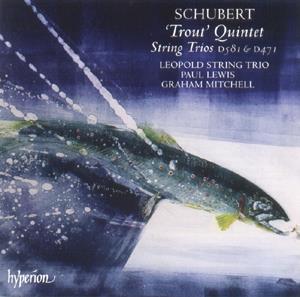 |
|
SCHUBERT: TROUT QUINTET * LEOPOLD STRING
TRIO * HYPERION CDA67527
|
|
0 |
5 |
|
Performance |
 |
|
Sonics |
 |
|
No less than three major label recordings of the
'Trout' have crossed my desk in the past year. While each has its strengths,
the most recent, featuring Great Britain's Leopold String Trio augmented by
fast-rising pianist Paul Lewis and double bassist Graham Mitchell, has
caused me to hit repeat an almost embarrassing number of times. Framed the
only completed movement – the Allegro - of Schubert's String Trio in B flat
major, D471 plus the complete String Trio in B flat major, D581, the Leopold
'Trout' also ranks as the most clearly and naturally recorded of the bunch.
A good share of the success lies with Paul Lewis. The
protege of pianist Alfred Brendel takes marked delight in tickling the keys,
darting all over the place with a freshness and joy that find their parallel
in the composer's seemingly unstoppable stream of brilliant melodic
invention.
Around Lewis' piano, which creates a flowing, watery
core, the strings dart left and right, at times balancing and answering each
other as if leaping from one side of the stream to the other. The benefit of
a performance by a string trio with a 15-year, award-winning history can be
heard in their oneness of mind, producing a rendition thoroughly thought out
yet played as though for the first time.
Specific highlights: Where the much touted Belcea
Quartet augmented by pianist/composer Thomas AdËs (EMI) draw out the Finale
by playing all three of Schubert's repeats, the Leopold version benefits
immenselfy by cutting one of them. The Leopolds and friends also do the most
with the theme and variations. Enjoy the contrast between the gentle
slowness of the opening theme and the rollicking, almost carnival-like
vitality of the 3rd variation; the latter features Lewis in
outstanding form, his hands effortlessly flying all over the place.
The delicacy of the playing on the third recent
release, featuring Braley/Capucon/CaussÈ/Capucon/Posch (again on EMI), and
the wondrous sweetness of Renaud Capucon's Guarneri, cannot be denied. Yet
the new Hyperion disc has the touch of genius about it. The delights of the
works with which the Leopolds frame the 'Trout' make their disc a perfect
introduction to the melodic miracles of Franz Schubert. |
|

|
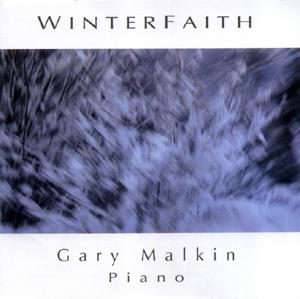 |
GARY MALKIN: WINTERFAITH * WISDOM
OF THE WORLD WW005
|
|
0 |
5 |
|
Performance |
 |
|
Sonics |
 |
|
Legions of New Age pianists could learn more than a
thing or two from Bay Area composer Gary Malkin. Where most plunge ahead,
heaping one note upon another as though terrified of the possibility of
silence, Malkin is content to let the notes comes as they will. He pauses,
reflects, speeds up and slows down, modulates volume, and pitches his voice
as his heart speaks to him in the moment. The result is an hour-plus CD of
great beauty.
Winterfaith has
a consistently gentle, unwaveringly wistful quality. The notes fall from
Malkin's fingers like gentle snowflakes melting on a windowpane, as though
the composer/pianist were gazing out at a lovely, pristine winter landscape.
In this particular case, one gathers from the brief liner notes that the
landscape is internal. As Malkin states, "Not until life brought me to my
own winter was I truly ready [to create the piano recording I had dreamt of
my whole life]." Spontaneously composed in one night's session as a tribute
to those he loves, the CD represents the artist's escape from his own inner
critic, which constantly declared he was not ready to make such a disc.
There's certainly no fear in the sixth track, "Endless," which exhibits
chromatic progressions that might terrify those who believe that spiritual
music only springs from major chords. Somewhat inspired by the pianism of
Keith Jarrett and Eric Satie, this lovely excursion will win many admirers
for an Emmy and ASCAP award-winning composer for film and television who
treads a path of service. |
|

|
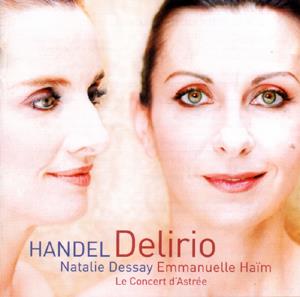 |
HANDEL: DELIRIO * NATALIE DESSAY
*EMMANUELLE HAIM * VIRGIN CLASSICS 094633 26242 3
|
|
0 |
5 |
|
Performance |
 |
|
Sonics |
 |
|
Heads up, lovers of great singing! High-flying French
coloratura soprano Natalie Dessay has scored another triumph with this
exquisite disc of three Italian Cantatas by George Frideric Handel.
As ideal in the romantic roles of Donizetti, Gounod,
Strauss, and Offenbach as in the earlier music of Mozart, Monteverdi, and
Handel, Dessay sings with a freedom and purity most sopranos only dream
about. In tones intentionally shorn of pretentious operatic glamour, she
sings with a direct, deeply felt sincerity rendered all the more miraculous
for the freedom with which she negotiates Handel's torturous runs of
emotionally-charged notes. Listen how, in the extended, 12-movement cantata
Delirio amoroso, her voice soars to
the stratosphere and then all over the emotional landscape on the words,
"Let a thought fly up to heaven, if in heaven is that lovely soul who stole
my peace of mind."
Expressing the feelings of an agitated woman "erratic
in her thoughts, but always beautiful," Dessay's heartbreaking utterances
are made all the more pathetic for the spring-like sweetness in which they
are uttered. Equal credit goes to director Emmanuelle Haim, whose authentic
instrument Le Concert d'Astree performs with rare, understated clarity. The
transparency of the playing, with notes lightly touched as though by a
zephyr, is irresistible. Accolades to violinist Stephanie-Marie Degand – to
all the soloists, actually – for the virtuosity they display in their duets
with Dessay. This is a CD to treasure. |
|

|
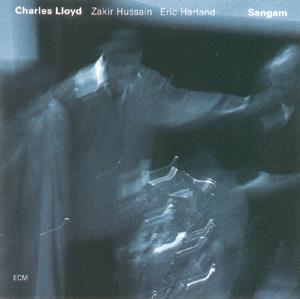 |
|
CHARLES LLOYD, ZAKIR HUSSAIN & ERIC HARLAND *
SANGAM *
ECM 1976
|
|
0 |
5 |
|
Performance |
 |
|
Sonics |
 |
|
Listening to this first outing of legendary jazz
saxophonist Charles Lloyd's new Sangam Trio, it is hard to decide who's more
mesmerizing: the phenomenal Indian tabla master, Zakir Hussain; Lloyd on
tenor and alto sax, bass and alto flutes, tarogato (whatever that is),
piano, and percussion; or relatively young buck Eric Harland on drums,
percussion, and piano. Recorded live in Santa Barbara in September 2004,
Hussain's percussion sometimes comes from the left channel, Harland's from
the right, with stereo effects reminiscent of the old Command demo lps that
fascinated hi-fi virgins at the dawn of the stereo era. The way these two
men play off each other, while Lloyd wails away in their midst as though all
life depends upon it, is breathtaking.
With great modesty, Lloyd has said of his
collaborations, "When the spirit is blowing, I know I have to hoist my sails
to catch the breeze." One of jazz's greats, he has worked with everyone from
Ornette Coleman to Keith Jarrett, while absorbing influences as far ranging
as Billy Holiday, Duke Ellington, Charlie Parker, Bela Bartok, Gabor Szabo,
Sufi teacher Hazrat Inayat Khan, and a host of Indian musicians. He
epitomizes the spiritual essence of sangam,
which literally or metaphorically signifies confluence, a meeting place, a
gathering or coming together.
This music was neither rehearsed nor planned out in
advance; it literally happened on the spot. When Hussain asked Lloyd in what
key he should tune the tabla, Lloyd responded, "Oh just tune to the key of
the universe." Hussain decided the universe hums in B-flat, and away they
went. The men share a spiritual bond, reflected in the titles of their nine
improvisations -- e.g. "Tales of Rumi," "Hymn to the Mother," and "Little
Peace" -- and the faith that their music will cohere. Cohere it does, as
when the brief, exquisitely lyrical piano excursion "Nataraj" gives way to
the restrained mysticism of "Guman," as percussionists move around the stage
before Hussain begins to sing sweetly to sparse accompaniment. Even late and
reluctant converts to jazz, such as myself, can be easily hooked by such
musical miracles. |
|

|
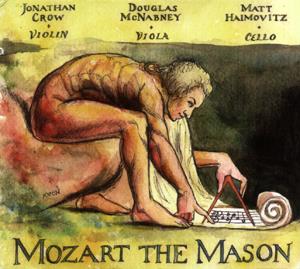 |
|
JONATHAN CROW, DOUGLAS MCNABNEY & MATT
HAIMOVITZ *
MOZART THE MASON * OXINGALE OX2008
|
|
0 |
5 |
|
Performance |
 |
|
Sonics |
 |
|
Recorded in Quebec one year after Sangam,
this recording presents an equally fresh trio performing music as spiritual,
albeit more tonal, as the Sangam Trio's. Here the instruments are of the
traditional Western string trio - violin, viola, and cello – played with
enviable restraint, as if of one mind, by compatriot faculty members at
McGill University.
The CD begins with one of the only two complete works
for string trio in Mozart's catalogue, his transcription of J.S. Bach's
Preludes and Fugues, K404a. In this trio's hands, it is fascinating to hear
Bach's baroque classicism illuminated in soft, quasi-romantic light.
More classic in its approach is Mozart's mature
Divertimento in E flat, K563, composed three years before his death at age
35. Violinist Jonathan Crow, Concertmaster of the Montreal Symphony
Orchestra, has a bright-edged, finely focused sweet sound that harmonizes
beautifully with Douglas McNabney's viola. Award-winning cellist Matt
Haimovitz balances the higher strings with an exceedingly warm, almost
self-effacing touch that gently reaches into the heart of Mozart's mature
masterpiece. We may not be consciously aware of the Masonic ideals and
symbolic numbers that Mozart expresses in the work, which shares the same
key as the composer's other great tribute to the Masonic order, The Magic
Flute, but its nobility of expression
speaks volumes. The extended second movement Adagio is exquisite, the three
musicians dialoguing with a heartfelt, elevated grace that seems the
antithesis of the tripe that passes for public discourse in the 21st
century. There is no opposition here, just the embrace of all that is pure
and kind. Listen to the high spirits of the first Minuet, and the joy and
humor of a composer who so easily tuned into the essence of cosmic balance.
What a beautiful way to celebrate the 250th anniversary of
Mozart's birth. |
|

|
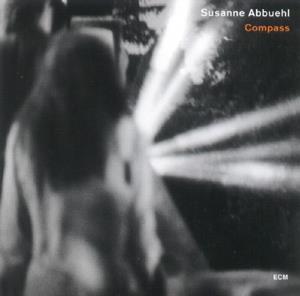 |
SUSANNE ABBUEHL * COMPASS * ECM
1906
|
|
0 |
5 |
|
Performance |
 |
|
Sonics |
 |
|
I'm not easily seduced, but Susanne Abbuehl has had her
way with me. On her sophomore outing from the ever-adventurous ECM label –
her 2001 debut disc, April, won the
Edison Music Award – the understated Swish-Dutch singer's half-voiced
utterances, as clear as speech, haunt the consciousness in ways that most
jazz singers merely hint at. Two of Abbuehl's arrangements, "Black is the
Color" and "Lo FiolairÈ" (popularized in Joseph Canteloube's settings of
Songs of the Auvergne) are
based on Luciano Berio's justly famous arrangements of Folk Songs
from many lands. "Lo FiolairÈ" in particular is distinguished by the soft,
resonant lines of Christof May and Michel Portal's clarinet/bass clarinet
accompaniment, which dance with mystic grace behind Abbuehl's breathy
utterances.
Abbuehl's original songs, including four settings of
works by James Joyce, and others from Feng Meng-Lung and William Carlos
Williams, are wondrous in their subtlety. Paying tribute to some of our jazz
greats, she also puts words to Sun Ra's "A Call for All Demons" and Chick
Corea's "Children's Song No. 1." (The sparse bass, bass clarinet, drum, wood
block and gong accompaniment on the Corea track, with lots of space between
sounds, is beyond words, and Pianist Wolfert Brederode and percussionist
Lucas Niggli know just when to play, and when to remain silent).
This is brilliant work. Certain to win a large
following among jazz intellectuals,
the haunting tracks of Compass,
are best heard in half-light, with both eyes open. |
|

|
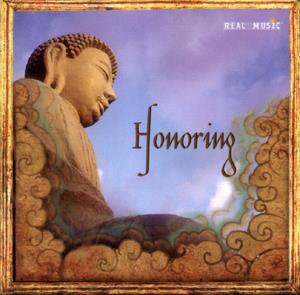 |
HONORING * REAL MUSIC/REAL MYSTIC
RM 1279
|
|
0 |
5 |
|
Performance |
 |
|
Sonics |
 |
|
Real Music's Real Mystic imprint again pairs an
hour-long compilation of Eastern-based, spiritual music with a lovely,
16-minute meditation led by label founder Terrence Yallop. The musical
selections blend seamlessly, as if they were meant to be together; all speak
to the core, heartfelt essence of the New Age. Many of the musicians are
well known: Karunesh, Ben Leinbach, Buedi Siebert, and the beautiful voiced
Deva Premal rub shoulders with others perhaps less well known but no less
gifted.
What sets this CD apart from others is the care with
which the tracks have been programmed. Yallop clearly understands what music
speaks of transcendence, and what gets trapped in denial and maya
(illusion). Whether for solo flight, healing work, or sharing with intimate
friends, this is one beautiful CD. Kudos to Real Music for their entreaty to
not compromise the ability of New Age labels and musicians to make a living
by burning copies for friends. |
|

|
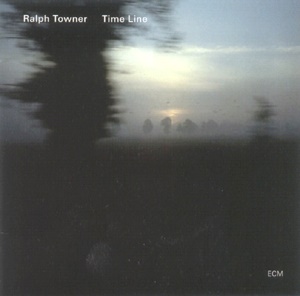 |
RALPH TOWNER * TIME LINE * ECM
1968
|
|
0 |
5 |
|
Performance |
 |
|
Sonics |
 |
|
Acoustic guitarist Ralph Towner, 66, had appeared on
over 30 albums since 1970. A very selective list of the solo musicians and
groups he has worked with includes the Paul Winter Consort, Keith Jarrett,
Weather Report, Gary Burton, Jan Garbarek (on a Solstice
collaboration with that earned the Deutsche Schallplatten Preis - Germany's
equivalent of the Grammy - for best jazz recording of 1976, worldwide), and
Oregon (their Ecotopia
collaboration received a Deutsche Schallplatten Preis in 1988).
Towner's daring music has also accompanied the Alvin Ailey, Pilobolus and
Murray Louis dance companies.
Time Line finds
Towner in an exploratory mood. While some of the tracks, including Harold
Arlen's Come Rain or Come Shine,
swing, many of Towner's original compositions find him in a mellow mood.
That's not to suggest complacency. Everywhere he journeys into uncharted
territory, exploring far out harmonies with an unpretentious genius that
defies categorization. You'll have trouble identifying the Arlen tune or
George Gershwin's My Man's Gone Now
once Towner gets going, his excursions stray so far from the melody line.
This is jazz at its esoteric best. |
|

|
|
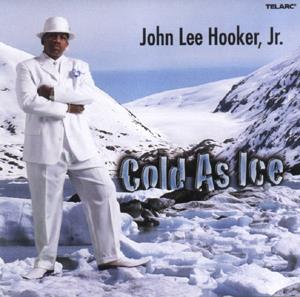 |
JOHN LEE HOOKER, JR * COLD AS ICE
* TELARC CD-83642
|
|
0 |
5 |
|
Performance |
 |
|
Sonics |
 |
|
The son of legendary bluesman John Lee Hooker has spent
the last few decades living the blues rather than singing them. After
emerging from drugs, alcohol, divorce, and incarceration to return to music,
he quickly garnered a Grammy nomination and awards from the California Music
Awards and Bay Area Blues Society. One listen will tell you why major label
Telarc just signed him up. In a style that he has called "two parts R&B. one
part jazz and "down home blues", John Lee Hooker, Jr. sings 12 songs whose
naked autobiographical content (or so it seems) may blow your mind. Hooker
speaks more truth than a small arsenal of rappers loaded with self-serving
indulgences. The opening track, "You Blew It Baby," and the subsequent "Fed
Up" give you some idea of his subject matter. How's this line, "I was
trapped like Little Jack Horner, trapped in a corner, couldn't move"? Hooker
uses lots of word to tell tales set to melodies similar to those we've heard
blues artists sing for many a moon, but his authenticity and humor will keep
you glued. |
- Jason Victor Serinus
-
Terms and Conditions of Use
|